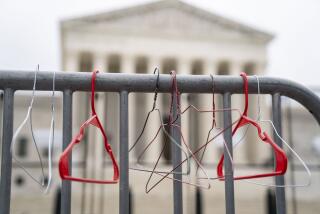Democrats, GOP Discuss Defusing Judicial Conflict
- Share via
WASHINGTON — With a showdown building over President Bush’s federal court nominees, Democrats and Republicans on Monday discussed compromise offers and counteroffers -- some in public, some in private -- that many lawmakers were hoping might defuse the potential conflict.
Two leading senators -- a Democrat and a Republican -- urged colleagues from the chamber’s floor to lower tensions over blocked judicial confirmations by moving ahead on nominees whom Democrats opposed but had pledged not to filibuster.
A third senator, Democrat Ben Nelson of Nebraska, said he was working privately to round up six Democratic colleagues to join in a deal with six Republicans that would force both sides to step back.
“I think that most of us feel that we’ve got to do something, and we ought to be able to put our minds together and come up with something,” Nelson said on CNN’s “Inside Politics.”
Nelson said that under the compromise, the six Republicans would agree not to support a move to prevent use of the filibuster to block judicial nominees. Democrats would agree to allow floor votes on some or all of the seven Bush nominees whom they had blocked but whom the president resubmitted for confirmation this year.
However, neither side offered to change positions on use of the filibuster for future nominations, especially to the Supreme Court. Both sides describe that as the sticking point in any deal.
The Republicans, who hold 55 seats, contend that nominees are entitled to an up-or-down vote. GOP Senate leaders want to change the filibuster rule -- which requires 60 votes to end debate -- to prevent Democrats from using the tactic to block judicial nominations. Under the rule change, 51 votes would be needed for confirmation.
Democrats want to reserve their right to filibuster nominees they consider extremist.
“No one on the Democratic side gives up their right to use a filibuster,” Nelson said, describing his proposal. “They’re just simply saying that they wouldn’t do it except in exceptional circumstances, if you really had a nominee that you just simply couldn’t live with. But one would hope that those would be few and far between.”
Nelson said the compromise was also being promoted by Sen. Trent Lott (R-Miss.). But Lott’s office denied he had agreed to any deal with Nelson that would leave Democrats the option of using the filibuster on judicial nominees in the future.
“Sen. Lott ... did not even speak with Sen. Nelson last week or this weekend,” his spokeswoman, Susan Irby, said in a statement. “He has not changed his contention that all judicial nominees should have an up-or-down vote on the Senate floor.”
A spokeswoman for Senate Majority Leader Bill Frist (R-Tenn.) said he would welcome a Lott-Nelson agreement as long as Democrats could not filibuster future nominations.
“If he can get a deal with the Democrats that gets an up-or-down vote, that would be great,” said Frist spokeswoman Amy Call.
On the Senate floor, Minority Leader Harry Reid (D-Nev.) offered a different approach, urging Republicans to put Thomas B. Griffith, a Utah lawyer nominated to the District of Columbia Court of Appeals, on the Senate agenda for a confirmation vote. He noted that many Democrats opposed Griffith, who would have a lifetime appointment to the second-most-powerful court in the country.
“A number of Democrats will vote against confirmation on the floor. But we know the difference between opposing nominees and blocking nominees,” Reid said. “We will oppose bad nominees, but we will only block unacceptable nominees.”
Reid said that Republicans, at the behest of the White House, were refusing to move on to less controversial nominees, such as Griffith, in an effort to make Democrats look obstructionist.
“One reason why the White House won’t send new judges to the Senate is that they don’t want to give Senate Democrats a chance to continue to demonstrate that we are reasonable,” Reid said.
Sen. Arlen Specter (R-Pa.), chairman of the Judiciary Committee, made a similar appeal from the other side of the partisan divide, saying that his committee had approved at least five Bush nominees that Democrats wouldn’t filibuster.
“The fact is that all, or almost all, senators want to avoid the crisis,” Specter said. “I suggest the way to work through the current impasse is to proceed to bring to the floor circuit nominees one by one for up-or-down votes.”
Since Bush took office, Democrats have blocked 10 of his nominees to federal appellate courts. Republicans say that represents an unprecedented use of the filibuster on judicial nominees. Democrats respond that they allowed votes on 25 other appellate court nominees and have permitted confirmation of nearly 200 lower court nominees.
If Republicans change the filibuster rule, Democrats have threatened to retaliate through parliamentary procedure to stall legislation on issues important to Bush and the GOP. The rule change is widely described as the “nuclear option” because of its potential effect on Senate operations.
Frist, who made a compromise offer last month, said Reid’s counteroffer was a “first step” but gave no indication whether he would accept it.
In Frist’s compromise proposal April 28, he offered Democrats 100 hours to debate controversial nominees on the condition that they would not block confirmation votes.
More to Read
Get the L.A. Times Politics newsletter
Deeply reported insights into legislation, politics and policy from Sacramento, Washington and beyond. In your inbox twice per week.
You may occasionally receive promotional content from the Los Angeles Times.










